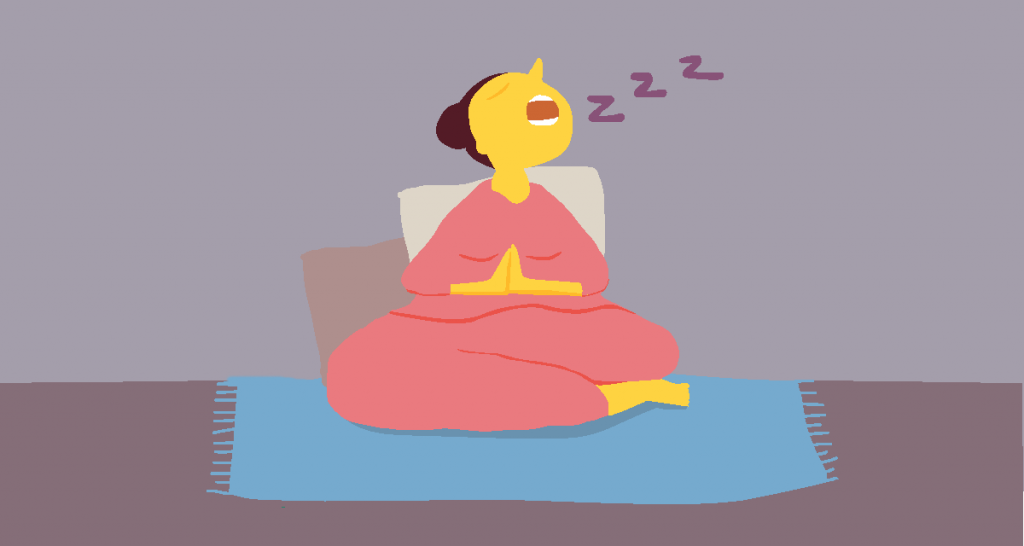Pray, meditate or practice slow deep breathing exercises for at least 11 minutes before bed to increase melatonin levels.
Melatonin is a hormone manufactured in the brain by the pineal gland, from the amino acid tryptophan. It has been called the “miracle drug from within”. It activates the immune system, acts as an extremely powerful antioxidant and regulates the circadian rhythms. Melatonin is produced while the body is at rest – primarily during the night between 1:00 – 3:00 a.m., if you are sleeping in a dark room.
Melatonin and Cell Division
One of the functions of melatonin is to regulate cell division and multiplication. When the pineal gland is not functioning properly and melatonin levels are low, there will be increased cell division and multiplication and a greater likelihood of cancer. Often the lower the melatonin, the more advanced the cancer.
Practicing slow breathing exercises for at least 11 minutes can help regulate the breath cycle. What do we mean by the breath cycle? Ordinarily one nostril is dominant for 60-90 minutes, then both nostrils are equally open for 20 minutes, and then the other nostril dominates for 60-90 minutes. We know that cell division is linked with melatonin, which can be regulated by a balanced breath cycle, as well as by sleeping in a dark room.
The complete process of cell division typically takes between 1½ to 2 hours, with a 20-minute critical period of time when molecules called “cyclins” accumulate in the cell to determine if and when it will divide. The mechanism for this is likely linked to the release of melatonin from the pineal gland.
Meditation Increases Melatonin
We can help to prevent breast cancer by keeping our melatonin levels high through an evening meditation practice. When we develop and practice a slow, meditative breath, night-time melatonin levels increase as the pineal gland responds with renewed vigour.
In 1995, researchers at the University of Massachusetts Medical Center’s Stress Reduction and Relaxation Program found that meditators had significantly higher melatonin levels than non-meditators.
They also found that when the test subjects did not meditate, their melatonin levels did not increase that night. The conclusion was that daily meditation, particularly before bedtime, increases melatonin production.
Meditation stimulates the pineal gland, although scientists are not clear on exactly how. What is known is that melatonin levels increase immediately after meditating – perhaps it is the fact that the eyes are closed (shutting out light), and/or the body’s “relaxation response”, that stimulates the pineal gland. In any case, you can increase your melatonin levels naturally and safely by meditating for at least 11 minutes – and reap the benefits.
A Simple Meditation to Do Before Bedtime
This meditation is a Kundalini Yoga meditation taught by Yogi Bhajan. It is called Shabd Kriya. Sit in any comfortable posture with the spine straight. Place the hands in the lap, palms up with the right hand over the left. The pads of the thumbs are together and point forward. Focus the eyes on the tip of the nose, the eyelids half-closed. Inhale in 4 equal parts, mentally vibrating the mantra SA-TA-NA-MA. Hold the breath, vibrating the mantra 4 times for a total of 16 beats. Exhale in 2 equal strokes projecting mentally “Wahe Guru.” Continue for 15 to 62 minutes.
When practiced regularly, sleep will be deep and relaxed and the nerves will regenerate. After a few months, the rhythm of your breath as you sleep will be subconsciously regulated in the same rhythm! You will think better, work better, share better, love better, and fight better. This rhythmic mantra will eventually progress so that even in daily activities you will automatically hear the mantra and take on the breath rhythm.
Here’s a video taught by Sat Dharam Kaur ND and modelled by Gurushabd Khalsa to guide you in the practice of this meditation.
References:
Martarelli D, Cocchioni M, Pompei P. Diaphragmatic breathing reduces exercise-induced oxidative stress. Evid Based Complement Alternat Med. 2011; 932/430
Cos S, Mediaville MD et al. Does melatonin induce apoptosis in MCF-7 human breast cancer cells in vitro? J Pineal Res. 2002 Mar;32(2):90-6
Fernendes Ca, Nobrega YK, Tosta CE. Pranic meditation affects phagocyte functions and hormonal levels of recent practitioners. J Altern Complement Med. 2012 Aug;18(8):761-8
Black DS, Cole SW, Irwin MR, Breen E et al. Yogic meditation reverses NF-kB and IRF-related transcriptome dynamics in leukocytes of family dementia caregivers in a randomized controlled trial. Journ Psychoneuroendocrinology. 2013 Mar;38(3):348-355.
http://en.wikipedia.org/wiki/IRF1#cite_note-Dornan_D-5
How meditation boosts melatonin production
Solberg EE, Holen A, Ekeberg Ø, Østerud B, Halvorsen R, Sandvik L., The effects of long meditation on plasma melatonin and blood serotonin. Med Sci Monit. 2004 Mar;10(3):CR96-101.
Massion AO, Teas J, Hebert JR, Wertheimer MD, Kabat-Zinn J., Meditation, melatonin and breast/prostate cancer: hypothesis and preliminary data. Med Hypotheses. 1995 Jan;44(1):39-46.
Take the Breast Health Challenge!
Meditate before bed and take a photo or make a video of you doing it, and post on your Facebook page, Youtube or Instagram with the hashtag #breasthealthchallenge between Oct 1-31. Challenge your friends to do the same.
Sign up to receive daily tips in October: Sign Up
Tell us about your evening practice in the comments section below. Let’s share what works!
Click here to see all tips
Upcoming Programs
For upcoming Healthy Breast Programs see http://mammalive.net/upcoming-courses/




